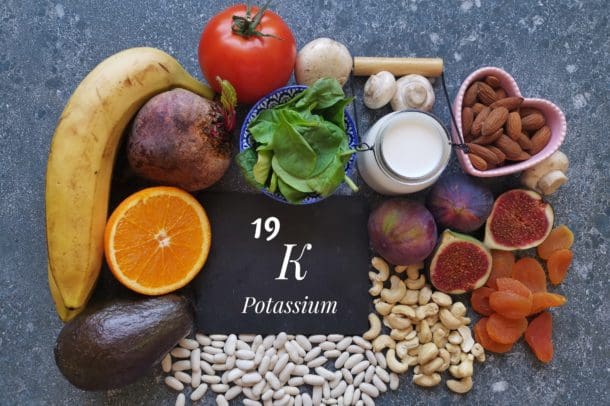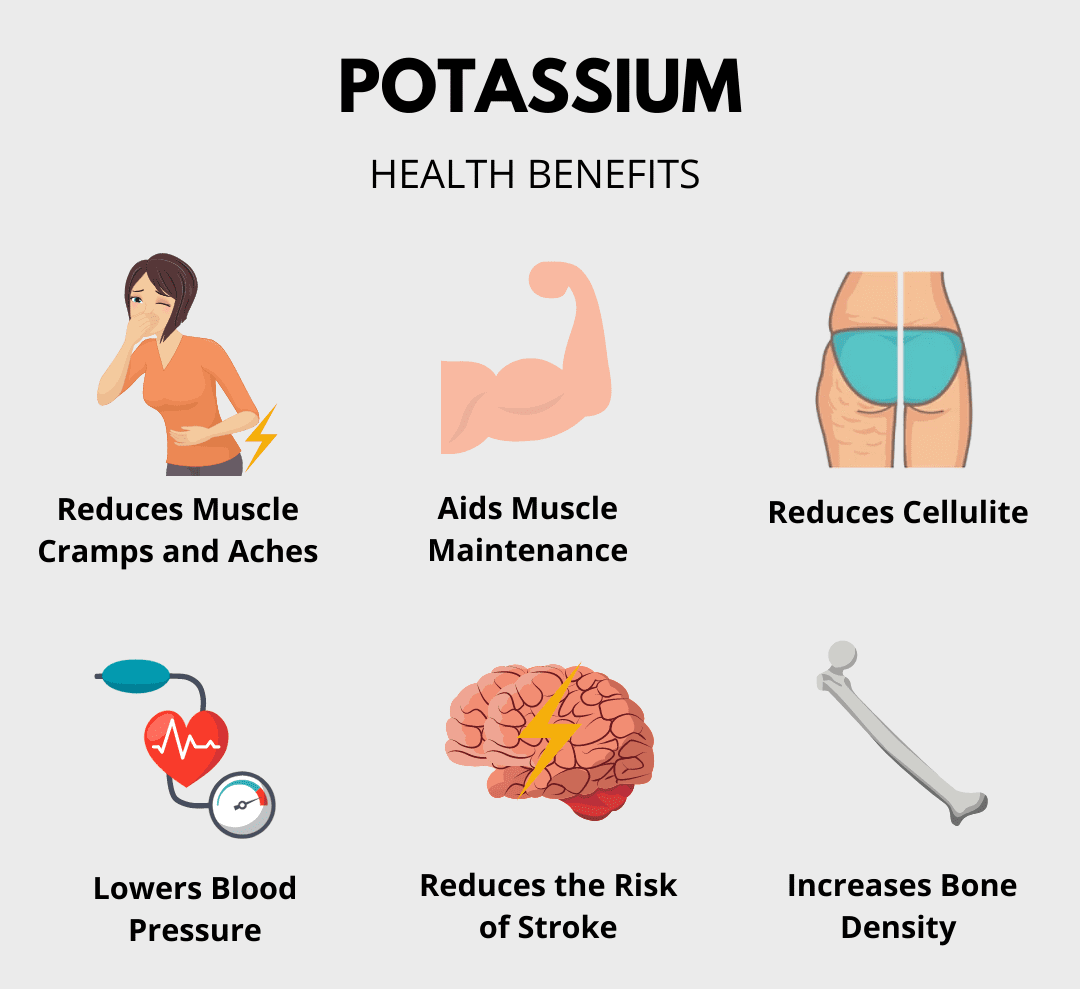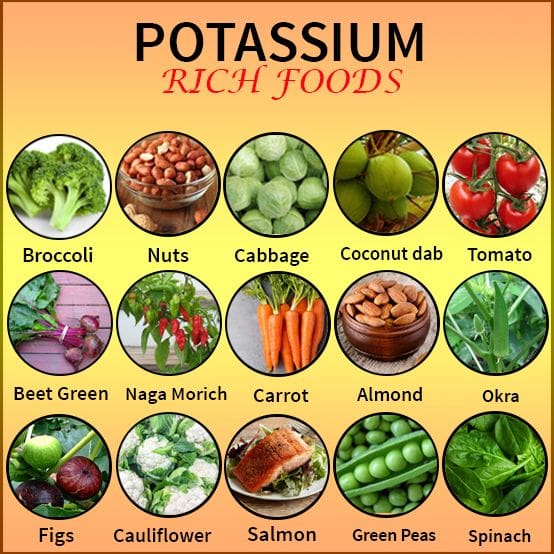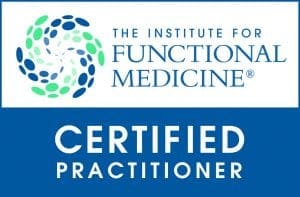Table of Contents
Introduction
As more and more people start to keep track of their health, many often try to figure out what foods contain the right amount of vitamins and supplements to benefit their bodies and support the vital organs and the body’s gene levels. Many fruits and vegetables have a chock-full of vitamins and minerals that the body needs for energy and to prevent chronic issues from affecting the body. Today’s article looks at the most beneficial mineral the body needs, potassium, its benefits, and what kind of foods have potassium for the body. We refer our patients to certified providers that consolidate many available treatments for many individuals suffering from low potassium levels affecting a person’s body and correlating to chronic conditions that can cause overlapping risk profiles. We encourage each patient by referring them to associated medical providers based on their diagnosis when it is appropriate. We understand that education is a fantastic way when asking our providers intricated questions at the patient’s request and understanding. Dr. Jimenez, D.C., only utilizes this information as an educational service. Disclaimer
What Is Potassium?

Have you been experiencing muscle cramps and aches throughout your entire body? What about feeling tired constantly or experiencing low energy? Or have you noticed that your blood pressure is elevated? Many of these chronic issues are correlated with low levels of potassium in the body. Studies reveal that potassium is an essential mineral that the human body needs to function properly. Potassium is important since it is an electrolyte to replenish the body when a person sweats. Many athletic people need to fill their bodies with electrolytes after an intense workout session to ensure that the extracellular and intracellular compartments are hydrated. Additional studies also mentioned that potassium is one of the shortfall nutrients that many people often forget because of the adequate intake that needs to be met for the body to have the recommended amount of potassium to function throughout the entire day. However, incorporating different types of food that have potassium can provide the recommended amount that the individual needs and provide beneficial results.
The Benefits Of Potassium
When it comes to the body and potassium, there are many beneficial factors that this essential mineral can provide. Research studies have revealed that increasing potassium intake with healthy, nutritious foods can benefit body health. Some of the beneficial properties that potassium can provide include the following:
- Lowering blood pressure
- Reduce the progression of renal disease
- Decrease the risk of osteoporosis
- Manages hypercalciuria
- Prevent diabetes development
All these chronic issues that can affect the body are correlated with low potassium levels. When the body doesn’t have the right amount of vitamins and supplements to help prevent these issues, it can lead to pain-like symptoms associated with the muscles, joints, and vital organs. So when pain specialists like chiropractors or functional medicine doctors thoroughly examine patients and ask questions to determine if the patient’s body has low potassium levels. When the body has low potassium levels, studies reveal that chronic issues like hypertension and elevated glucose levels could potentially lead to cardiovascular problems associated with chest pain and diabetes. When these overlapping issues affect the body, it is known as somato-visceral pain. Somato-visceral pain is when the affected organs are causing problems to the body’s muscles and causing referred pain in different locations.
An Overview Of Potassium

Biomedical physiologist expert Alex Jimenez is going to be going over potassium. He mentions that potassium is a cat ion that is positively charged. So potassium is important for a few different reasons. It helps us regulate our heartbeat. It helps us regulate how our muscle and nervous tissue work, and it’s important for synthesizing protein and metabolizing carbohydrates. The recommended daily amount of potassium is 4.7 grams for the U.S. and 3.5 for the U.K. So, an average of three and a half grams. When we think about potassium and what foods are high in potassium, what’s the first that comes to mind? The banana, right? A banana only has 420 or 422 milligrams of potassium. So to get our daily amount of potassium, that’s going to require us to eat eight and a half bananas. I don’t know anybody eating eight and a half bananas unless you’re a monkey. So let’s look at other foods high in potassium to help counterbalance the nutritional amount instead of just eating eight and a half bananas. Some foods high in potassium are dried fruits, specifically dried apricots and raisins, which have about 250 milligrams per half-cup serving.
Foods That Are High In Potassium

It is easy to incorporate potassium into a person’s daily habits. Many pain specialists like chiropractors work with associated medical providers like nutritionists and physical therapists to restore the body, prevent chronic conditions from progressing further, and reduce muscle and joint pain. Everybody knows that bananas are one of the more known fruits with potassium; however, eating bananas alone can be tiresome. So many fruits and vegetables have higher potassium levels and can help replenish the body’s electrolytes. Some of the nutritious foods that have potassium include:
- Banana
- Avocado
- Sweet Potatoes
- Spinach
- Dried Fruits (Apricots, Raisins, Peaches, Prunes)
Now eating potassium-riched foods can help the body’s intra- and extracellular water intake but combined with treatments and exercises can prevent chronic issues associated with muscle and joint pain. When people utilize these healthy habits in their daily lives, they can feel better and function throughout the day.
Conclusion
Trying to be healthier should not be difficult and can begin small with the right motivation. Incorporating a healthy diet combined with exercises and therapy treatments can restore the body to its healthier version and prevent overlapping issues affecting the muscles, joints, vital organs, and gene levels. Eating whole, nutritional foods filled with potassium can help restore lost electrolytes and help prevent chronic disorders from progressing further in the body to avoid muscle and joint pain.
References
He, Feng J, and Graham A MacGregor. “Beneficial Effects of Potassium on Human Health.” Physiologia Plantarum, U.S. National Library of Medicine, Aug. 2008, https://pubmed.ncbi.nlm.nih.gov/18724413/.
Stone, Michael S, et al. “Potassium Intake, Bioavailability, Hypertension, and Glucose Control.” Nutrients, U.S. National Library of Medicine, 22 July 2016, https://www.ncbi.nlm.nih.gov/pmc/articles/PMC4963920/.
Sur, Moushumi, and Shamim S Mohiuddin. “Potassium – StatPearls – NCBI Bookshelf.” In: StatPearls [Internet]. Treasure Island (FL), StatPearls Publishing, 11 May 2022, https://www.ncbi.nlm.nih.gov/books/NBK539791/.
Weaver, Connie M. “Potassium and Health.” Advances in Nutrition (Bethesda, Md.), U.S. National Library of Medicine, 1 May 2013, https://www.ncbi.nlm.nih.gov/pmc/articles/PMC3650509/.
Disclaimer
General Disclaimer
Professional Scope of Practice *
The information herein on "What Are The Benefits Of Potassium?" is not intended to replace a one-on-one relationship with a qualified health care professional or licensed physician and is not medical advice. We encourage you to make healthcare decisions based on your research and partnership with a qualified healthcare professional.
Blog Information & Scope Discussions
Welcome to El Paso's Premier Wellness and Injury Care Clinic & Wellness Blog, where Dr. Alex Jimenez, DC, FNP-C, a Multi-State board-certified Family Practice Nurse Practitioner (FNP-BC) and Chiropractor (DC), presents insights on how our multidisciplinary team is dedicated to holistic healing and personalized care. Our practice aligns with evidence-based treatment protocols inspired by integrative medicine principles, similar to those found on this site and our family practice-based chiromed.com site, focusing on restoring health naturally for patients of all ages.
Our areas of multidisciplinary practice include Wellness & Nutrition, Chronic Pain, Personal Injury, Auto Accident Care, Work Injuries, Back Injury, Low Back Pain, Neck Pain, Migraine Headaches, Sports Injuries, Severe Sciatica, Scoliosis, Complex Herniated Discs, Fibromyalgia, Chronic Pain, Complex Injuries, Stress Management, Functional Medicine Treatments, and in-scope care protocols.
Our information scope is multidisciplinary, focusing on musculoskeletal and physical medicine, wellness, contributing etiological viscerosomatic disturbances within clinical presentations, associated somato-visceral reflex clinical dynamics, subluxation complexes, sensitive health issues, and functional medicine articles, topics, and discussions.
We provide and present clinical collaboration with specialists from various disciplines. Each specialist is governed by their professional scope of practice and their jurisdiction of licensure. We use functional health & wellness protocols to treat and support care for musculoskeletal injuries or disorders.
Our videos, posts, topics, and insights address clinical matters and issues that are directly or indirectly related to our clinical scope of practice.
Our office has made a reasonable effort to provide supportive citations and has identified relevant research studies that support our posts. We provide copies of supporting research studies upon request to regulatory boards and the public.
We understand that we cover matters that require an additional explanation of how they may assist in a particular care plan or treatment protocol; therefore, to discuss the subject matter above further, please feel free to ask Dr. Alex Jimenez, DC, APRN, FNP-BC, or contact us at 915-850-0900.
We are here to help you and your family.
Blessings
Dr. Alex Jimenez DC, MSACP, APRN, FNP-BC*, CCST, IFMCP, CFMP, ATN
email: coach@elpasofunctionalmedicine.com
Multidisciplinary Licensing & Board Certifications:
Licensed as a Doctor of Chiropractic (DC) in Texas & New Mexico*
Texas DC License #: TX5807, Verified: TX5807
New Mexico DC License #: NM-DC2182, Verified: NM-DC2182
Multi-State Advanced Practice Registered Nurse (APRN*) in Texas & Multistate
Multistate Compact RN License by Endorsement (42 States)
Texas APRN License #: 1191402, Verified: 1191402 *
Florida APRN License #: 11043890, Verified: APRN11043890 *
* Prescriptive Authority Authorized
ANCC FNP-BC: Board Certified Nurse Practitioner*
Compact Status: Multi-State License: Authorized to Practice in 40 States*
Graduate with Honors: ICHS: MSN-FNP (Family Nurse Practitioner Program)
Degree Granted. Master's in Family Practice MSN Diploma (Cum Laude)
Dr. Alex Jimenez, DC, APRN, FNP-BC*, CFMP, IFMCP, ATN, CCST
My Digital Business Card
RN: Registered Nurse
APRNP: Advanced Practice Registered Nurse
FNP: Family Practice Specialization
DC: Doctor of Chiropractic
CFMP: Certified Functional Medicine Provider
MSN-FNP: Master of Science in Family Practice Medicine
MSACP: Master of Science in Advanced Clinical Practice
IFMCP: Institute of Functional Medicine
CCST: Certified Chiropractic Spinal Trauma
ATN: Advanced Translational Neutrogenomics




















